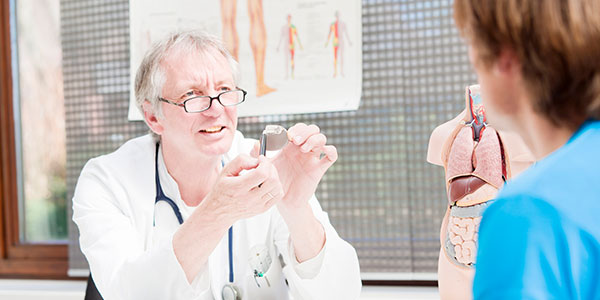Your heart is an amazing electrical machine, but sometimes its circuits don't function properly. An irregular heartbeat—too fast, too slow, too erratic—is called arrhythmia. Fortunately, several types of cardiac implantable devices may help. These small tools monitor your heart and send an electrical burst when needed to help your heart return to normal rhythm.

Talk to your doctor about these options.
- Pacemaker Services — A pacemaker is a small, battery-operated device that monitors your heartbeat with electrodes attached to the right atrium (upper chamber) and right ventricle (lower chamber). It then generates a low-energy pulse when your heart isn’t beating correctly. Your doctor implants the pacemaker under your skin, typically just below the left collarbone, using live X-rays to guide the insertion of wires into heart veins.
- Implantable Cardioverter-Defibrillator (ICD) Therapy — An ICD contains a pacemaker and sensors to pick up an abnormal heartbeat—particularly a dangerously fast or erratic rhythm. One to three electrodes connect veins in your heart to the device, which can send a high-energy pulse to immediately normalize an unsafe heartbeat, a process called defibrillation (defib for short). ICDs are usually implanted beneath skin on the left side of your chest.
- Biventricular Devices — For people with moderate or severe heart failure, these special pacemakers help restore the coordinated pumping actions of the heart’s left and right ventricles and sometimes the right atrium, a treatment called Cardiac Resynchronization Therapy (CRT). Wires connected to both ventricles send an electrical pulse to help them beat together, improving blood flow to your body. Doctors implant a biventricular device under the chest skin or, rarely, under the abdominal skin.
Some heart failure patients may benefit from a combination of CRT and ICD to resynchronize a weak heartbeat, slow down an abnormally fast heartbeat, speed up a slow heartbeat, or record data on heart rate and rhythm. Your doctor will help you decide on the best approach for your needs.
- Loop Recorder — This tiny, implanted heart monitor can collect data continuously for a long time—up to three years—enabling your doctor to capture information, such as an infrequent flutter, that a standard monitor or scan might miss. Using local anesthesia, your doctor implants the device through a small incision in the chest; the device then records and transmits your heart’s electrical impulses via wireless technology.









